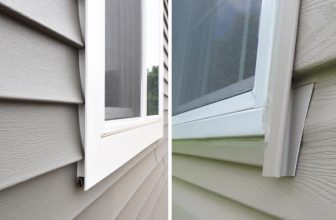How to Stop Dust Coming Through Windows
For most homeowners, dust is an unavoidable part of life. It gets everywhere and can be annoying to clean up. But there are some ways that you can reduce the amount of dust that comes into your home. One way is by using a lint roller on your clothes before putting them away in the closet or dresser drawers, so they don’t leave behind any unwanted residue when you take them out again later.
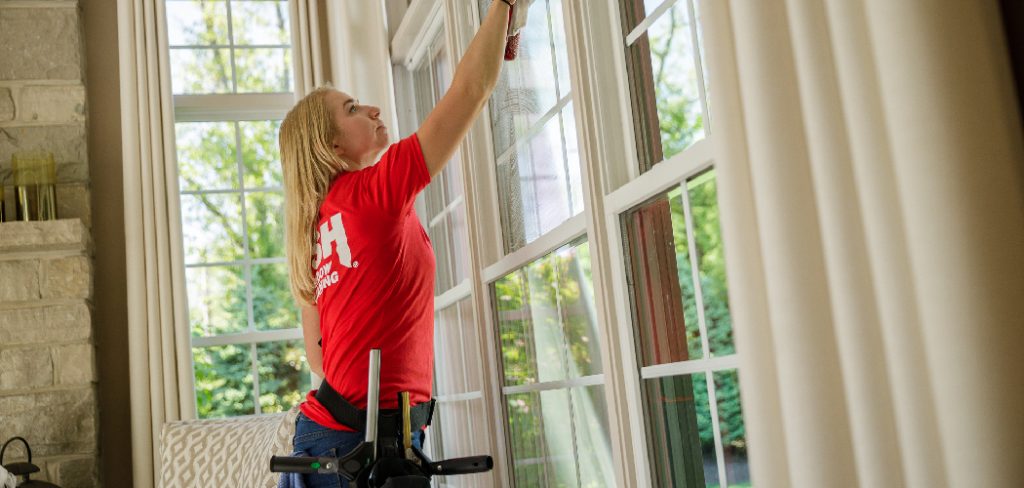
Another option would be to invest in window coverings for your window curtains or blinds. Hence, they remain closed when dust tends to accumulate the most, like after it rains or if it’s windy outside, which prevents dirt from entering through open windows with ease. If these options sound too expensive for you, then there are other options available on how to stop dust coming through windows. Read on to this blog post to learn those techniques.
What Causes Dust to Come Through Windows?
Before we dive into the ways to prevent dust from coming through windows, let’s first understand what causes it in the first place. Dust can come through your windows due to a variety of reasons. The most common ones are:
Poorly Sealed Windows:
If your windows are poorly sealed, then it’s likely that dust will seep in through the cracks and gaps around them.
Outdoor Environment:
If you live in a dusty area or near construction sites, then more dirt and debris may come through your windows due to the constant disturbance of the outdoor environment.
Lack of Window Maintenance:
Regular window maintenance is crucial for keeping dust out. If you neglect cleaning your windows or replacing old seals, then dust will easily enter your home.
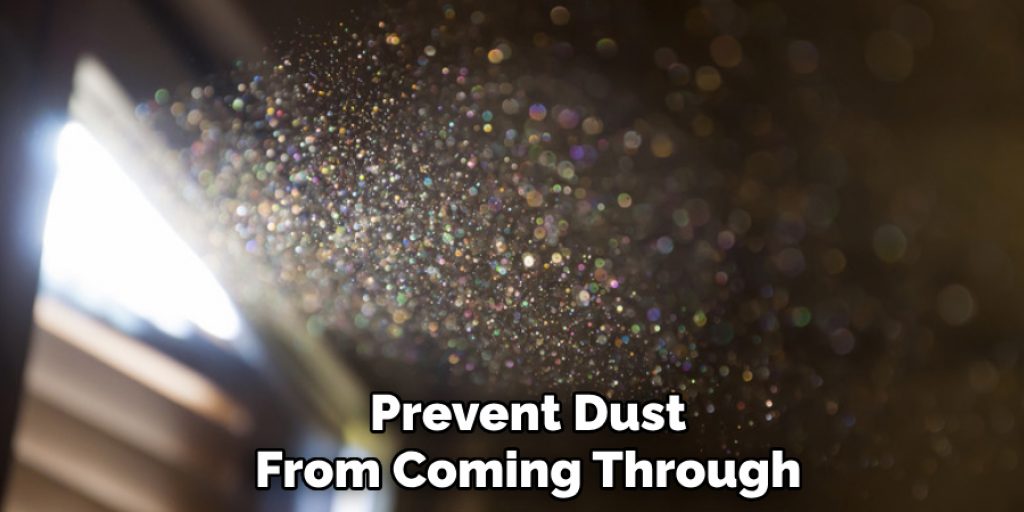
Techniques to Prevent Dust Coming Through Windows
Now that we know the main causes of dust coming through windows, let’s look at some techniques on how to stop it:
Use Weather Stripping:
Weatherstripping is an inexpensive and effective way to seal any gaps or cracks in your windows. It’s easy to install and can greatly reduce the amount of dust that enters your home.
Invest in Storm Windows:
If you live in an area with extreme weather conditions, then investing in storm windows can be a great solution. These windows provide an extra layer of protection against wind, rain, and dust.
Keep Windows Closed:
As simple as it sounds, keeping your windows closed can significantly reduce the amount of dust entering your home. This is especially important during windy or rainy days.

Regularly Clean and Maintain Windows:
Regularly cleaning and maintaining your windows can prevent dust from accumulating and seeping in through cracks. Make sure to clean both the interior and exterior of your windows and replace any worn-out seals.
Use Air Purifiers:
Air purifiers can help to filter out dust particles in your home, reducing the amount of dust that enters through your windows. They are affordable and easy to use, making them a great long-term investment for keeping your home dust-free.
10 Ways on How to Stop Dust Coming Through Windows:
1) Cover the Window With Plastic Sheeting
To do this, remove any blinds or curtains and completely cover the window with the sheeting; make sure it is air-tight to avoid dust coming through any holes. Tape all edges of the sheeting to prevent bumps from forming. You can also use this method if you are planning to paint your window frames or walls.
It’s also essential to note that this method can be temporary and not ideal for everyday use as it blocks out natural light and can make your home look darker. You can use it when you know that there will be a lot of dust coming through your windows, such as during construction or renovation.
2) Use Plastic Film
Apply a layer of double-sided tape to one side of the plastic film and adhere the film directly over the windowpane, pressing firmly so that there are no air bubbles in the adhesive. Apply a second layer on top of this for added strength.
You can also use this method for your car windows. If you live in a particularly dusty area or frequently drive on dirt roads, applying plastic film to your car windows can help keep them clean and dust-free. The added benefit is that it also provides some protection against scratches.
3) Use a Plastic Shower Curtain
Cover the window with a plastic shower curtain. Cut away any excess curtain from around the edges of the window and secure it tightly to the wall with tape. You can also use this method to cover your doors if they are not in use. It’s a quick and easy solution for keeping dust out, especially during windy days.
4) Remove the Window
You can also stop dust from coming through windows by removing them entirely, although this is not recommended unless you are comfortable doing so. If you decide to remove the window, consider placing a heater or small fan in the room instead of opening or replacing it with another window. It is a bit of a hassle, but it can prevent dust from entering your home. You can also use a temporary cover for the window opening, such as cardboard or plastic sheeting.
5) Apply Petroleum Jelly Around the Edge
This will create a barrier that will stop dust from getting into the room. Next, simply apply petroleum jelly to the edge around the glass of your window and wipe off any excess with a paper towel or rag, which you can clean afterward by using warm, soapy water and scrubbing it down with an old toothbrush. You will need to reapply the petroleum jelly every few weeks.

6) Install Draft Excluders
Draft excluders are cone-shaped devices that fit tightly in the bottom of a door or window frame to block air, sound, and dust from leaking in underneath. They are available at your local hardware store, or you can make one yourself by cutting scrap metal in the shape of a cone with sharp edges. Place the cone flat on the bottom of the door or window frame to stop dust from coming through. You can also use a small towel or rolled-up sock to create a similar effect. But make sure to replace them regularly, as they can collect dust and become dirty over time.
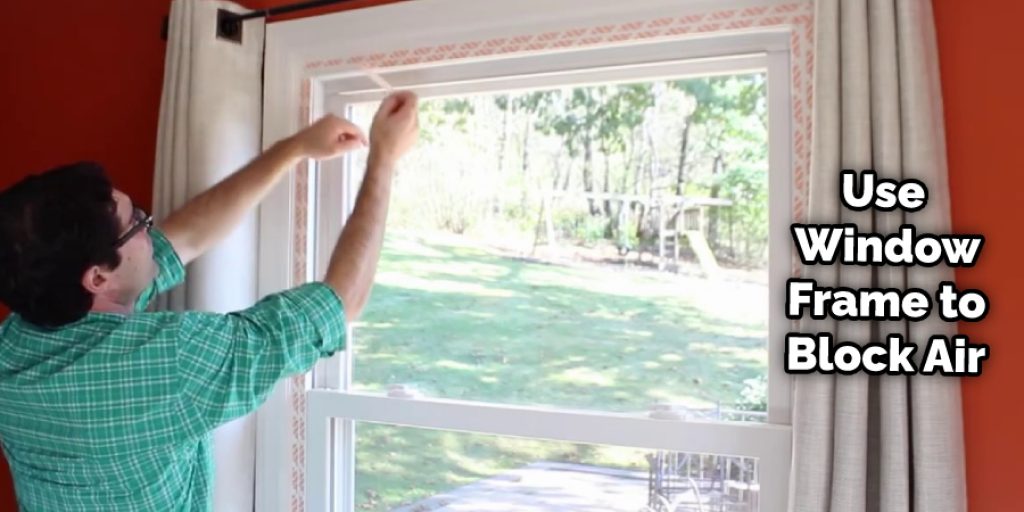
7) Install a Door Snake
A door snake is a simple device that keeps rain, wind, and dust from entering your home through your front door. It consists of an inflatable cylinder with an insert loop that slides into the bottom of the floor molding. When ready to use it, blow it into the tube until it inflates, and release the air until it’s very snug. Repeat the same process for all doors with gaps. You can also use a rolled-up towel as an alternative.
8) Install Screened Doors
Installing a screen door is one of the best ways to stop dust coming through windows and keep insects from entering your home, and it’s straightforward to do yourself. Just measure the space between two window frames or sliding glass doors and cut a piece of mesh that will fit snugly into that space. Next, attach the mesh to a frame and install it inside your door opening. You can secure the mesh to the frame using staples or small screws. This will provide a barrier against dust while still allowing fresher air to circulate.
9) Build a Storm Window
Storm windows are an easy way to stop dust from coming through the windows, stop drafts, and increase insulation. They can be made from old or discarded windows you might already have on hand; if not, they can be purchased at your local hardware store. Simply remove the window frame from your current windows and slide new ones into place. This is a great temporary solution for inclement weather.
10) Install Insect Screens
You can stop insects, dirt, dust, pollen, and even small animals from coming into your home by installing insect screens on all of your windows. Insect screens are inexpensive to buy or even make yourself using old window screening material, which you can cut to size and fit into the window frame. You can also choose to make your insect screens by cutting thin strips of screen material and tacking them to the inside of an open window frame.
Following these techniques and tips can greatly reduce the amount of dust coming through your windows, keeping your home cleaner and more comfortable.
Regularly maintaining your windows and investing in preventative measures can save you time, effort, and money in the long run. With some simple steps on how to stop dust coming through windows, you can keep your home dust-free and enjoy a healthier living environment. So don’t wait any longer; try out these solutions today and see the difference for yourself! Happy cleaning!
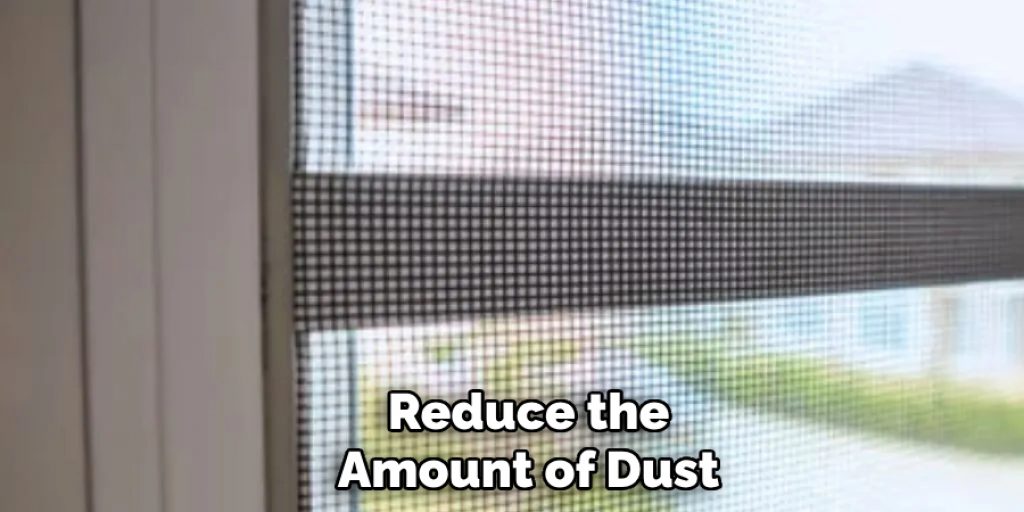
Tips to Prevent Dust in the Future:
1. Ensure that windows are well-sealed and air-tight. Caulking around the edges of windows and doors may help to stop dust from coming in.
2. If you cannot remove fixtures such as vents, choose a low-dust alternative like HEPA (High-Efficiency Particulate Air) filters or electrostatic filters. You can check out this link for more information on air filters.
3. To clean dust, use a damp cloth or microfiber cloth instead of paper towels or feather dusters. This will prevent small particles from flying into the air, which could irritate your lungs.
4. Take care when you are vacuuming. Some vacuums can kick up dust particles. Be sure that your vacuum doesn’t come with a pre-motor filter (and charcoal filters for bagless models); these should be replaced often to prevent dust from getting into the air and affecting you. Also, avoid using the brush attachment when you are vacuuming.
5. If you live in a dry climate, keep the humidity around your home between 45-55%. This can be done by using a humidifier or by running a cool-mist vaporizer.
6. Keep houseplants and other natural materials around your home to help improve air quality and filter dust particles from the air.
How Do Windows Accumulate Dust?
Dust is everywhere. Dust inevitably accumulates on windows, but it can also be easily avoided simply by following a few simple tips. Windows gets dust because the average household has many activities that generate particles of dirt and debris, such as cooking, cleaning, hobbies, pets, and smoking. Dust can come from outside, too; the rain may blow dirt and debris onto windows, or air pollution may settle on the glass.
Dust can accumulate on a previously clean window in as little as 24 hours because the material collects on the surface of the glass from tiny fragments that break off from larger particles. All dust is made up of small bits, but it can be composed of anything from pollen to coke spilled on a window. The biggest problem with the dust accumulating is that it makes the glass look fuzzy and dirty, but it can also affect your view, especially during rainy weather.

Frequently Asked Questions:
Q: How Often Should I Clean My Windows to Prevent Dust From Building Up?
A: It is recommended to clean your windows at least once a month to prevent a significant build-up of dust and dirt. You may need to clean them more frequently if you live in a particularly dusty area or have pets. You can also use the tips mentioned above to help prevent dust from accumulating on your windows in between cleanings.
Q: Is It Important to Use a Specific Type of Window Cleaner for Dust?
A: No, it is not necessary to use a specific type of window cleaner for dust. However, it is essential to use a cleaner that is safe for the type of windows you have (i.e., glass, vinyl, wood). You can also make your own homemade window cleaner using ingredients like vinegar and water. Just be sure to avoid using ammonia-based cleaners, as they can leave streaks and residue.
Q: Are There Any Benefits to Having Dust on My Windows?
A: No, there are no benefits to having dust on your windows. Dust can affect the appearance of your windows, make them harder to clean, and reduce the amount of natural light that comes through. It can also contribute to allergies and respiratory issues for those who are sensitive to dust. You can reduce the amount of dust on your windows by taking preventative measures and regularly cleaning them with a damp cloth or window cleaner.
Q: Can I Use a Dry Cloth to Clean My Windows?
A: No, it is not recommended to use a dry cloth to clean your windows. Dry clothes can cause dust particles to become airborne and spread around your home. It is best to use a damp or microfiber cloth when cleaning your windows to trap the dust and prevent it from spreading. So, it is essential to follow proper cleaning techniques and use appropriate materials for efficient removal of dust from windows. With these tips and techniques, you can easily prevent dust from accumulating on your windows and enjoy a clean, clear view of the outside world.
Q: Are There Any Other Benefits to Preventing Dust on Windows?
A: Yes, preventing dust on windows can also help improve the overall air quality in your home. Dust particles can circulate through your HVAC system and affect the air you breathe. By keeping your windows dust-free, you are promoting a cleaner and healthier living environment for yourself and your family. Additionally, reducing dust on windows can also help prolong the life of your window frames and seals, as dust particles can cause damage over time.
By taking preventive measures to keep dust off your windows, you are not only maintaining a clean and clear view but also protecting your home from potential damage. So, it is well worth the effort to regularly maintain and clean your windows to prevent the build-up of dust and enjoy the numerous benefits it offers. We hope these tips have been helpful and that you can now enjoy a cleaner and dust-free home with ease! Happy cleaning!

Conclusion:
You can stop dust from coming through your windows with a few simple steps. Keep the window clean and free of debris, install weather stripping to create an air-tight seal between the frame and sill, use drapes or blinds on the outside of the glass to screen out dirt and dust particles as they fly by, or choose double-pane windows for better insulation.
With a little elbow grease and the right, you can stop dust from coming through your windows! In this article, we’ve outlined some of our favorite ways how to stop dust coming through windows. If it sounds like one or more of these tips will work for you, go ahead and give them a try.




